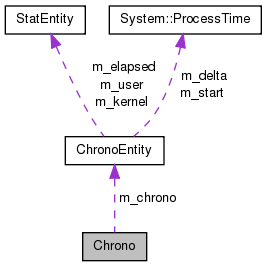A small utility class for chronometry of user codes.
More...
#include <GaudiKernel/Chrono.h>
A small utility class for chronometry of user codes.
- See also
- ChronoEntity
-
IChronoSvc
- Author
- Vanya Belyaev
- Date
- Nov 26, 1999
Definition at line 27 of file Chrono.h.
| Chrono::Chrono |
( |
IChronoSvc * |
svc = 0, |
|
|
const std::string & |
tag = "CHRONO::UNNAMED" |
|
) |
| |
|
inline |
Constructor from Chrono Service and the tag.
{
Chrono chrono ( svc ,
"some unique tag here" ) ;
for (
long i = 0 ;
i < 10000000 ; ++
i )
{
.. put some CPU-intensive computations here
}
}
- Parameters
-
Definition at line 53 of file Chrono.h.
56 {
if ( 0 != svc ) {
m_chrono = svc -> chronoStart ( tag ) ; } }
ChronoEntity * m_chrono
The actual chronometer.
| Chrono::Chrono |
( |
const std::string & |
tag, |
|
|
IChronoSvc * |
svc |
|
) |
| |
|
inline |
Constructor from Chrono Service and the tag.
{
Chrono chrono (
"some unique tag here" , svc ) ;
for (
long i = 0 ;
i < 10000000 ; ++
i )
{
.. put some CPU-intensive computations here
}
}
- Parameters
-
Definition at line 80 of file Chrono.h.
83 {
if ( 0 != svc ) {
m_chrono = svc -> chronoStart ( tag ) ; } }
ChronoEntity * m_chrono
The actual chronometer.
Constructor from Chrono Object/Entity.
{
Chrono chrono ( chronometer ) ;
for (
long i = 0 ;
i < 10000000 ; ++
i )
{
.. put some CPU-intensive computations here
}
}
- Parameters
-
| c | the pointer to Chrono Object/Entity |
Definition at line 105 of file Chrono.h.
ChronoEntity * m_chrono
The actual chronometer.
Constructor from Chrono Object/Entity.
{
for (
long i = 0 ;
i < 10000000 ; ++
i )
{
.. put some CPU-intensive computations here
}
}
- Parameters
-
| c | the reference to Chrono Object/Entity |
Definition at line 128 of file Chrono.h.
ChronoEntity * m_chrono
The actual chronometer.
Destructor , stop the chrono.
Definition at line 131 of file Chrono.h.
ChronoEntity * m_chrono
The actual chronometer.
IChronoSvc::ChronoStatus stop()
stop the chrono
| Chrono::Chrono |
( |
const Chrono & |
| ) |
|
|
private |
the copy constructor is disabled
the assignment operator is disabled
The actual chronometer.
Definition at line 143 of file Chrono.h.
The documentation for this class was generated from the following file:
